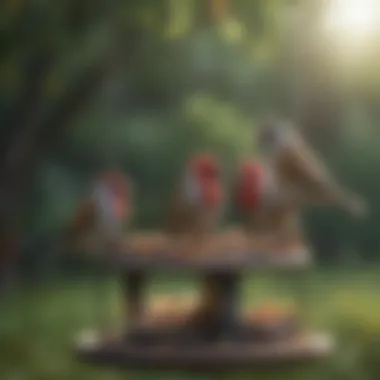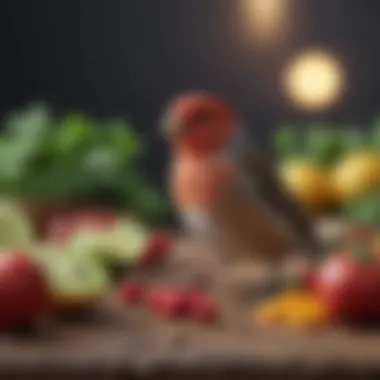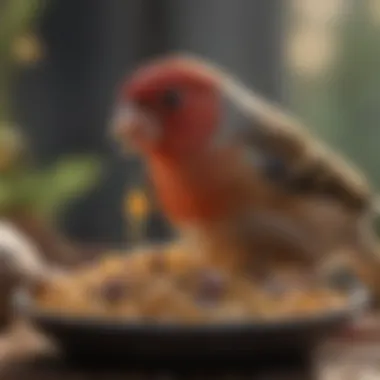The Ultimate Guide to the Best Finch Food Options


Intro
Feeding finches properly is essential for their health and well-being. This guide covers various aspects of finch nutrition, helping pet owners understand what food is best suited for their feathered friends. It is crucial to select the right diet for different finch species, ensuring all nutritional needs are met. The following sections outline necessary topics regarding finch care, including their daily feeding habits, grooming essentials, and health maintenance.
Understanding Your Pet
Pet Behavior Basics
Understanding finch behavior is vital for effective care. Finches are social birds. They thrive in groups, often displaying lively interactions with one another. Observing their behavior helps pet owners recognize signs of happiness or distress.
Common Breed Characteristics
Different finch breeds exhibit unique traits. For instance, Zebra finches are known for their cheerful chirps and active nature. In contrast, the Society finch tends to be more docile and friendly. Knowing these characteristics allows pet owners to cater their environment and care accordingly.
Species-Specific Needs
Feeding habits change based on species. Some finches prefer seeds, while others may enjoy fruits or leafy greens. It's crucial to research the specific dietary requirements of the finch breed you own. Tailoring a diet to fit these needs promotes better health and longevity.
Pet Care and Maintenance
Feeding Guidelines
A balanced diet includes a variety of foods. High-quality seed mixes, such as those from Kaytee or Lafeber, should form the base. Additionally, offering fresh fruits, vegetables, and protein sources like boiled eggs can enhance nutrition. Aim for daily fresh food and remove any uneaten portions to prevent spoilage.
Grooming Essentials
Grooming is also important. Finches do not require extensive grooming. However, providing cuttlefish bone or mineral blocks can help with beak maintenance and calcium intake. Regular observation can identify any feathers that may require care.
Hygiene Practices
Maintaining a clean habitat is very essential. Regularly clean the cage, food containers, and water dishes. This practice prevents the buildup of harmful bacteria and parasites. By ensuring hygiene, pet owners will contribute positively to their finch's overall health.
Health and Wellness
Routine Vet Check-ups
Routine check-ups with an avian veterinarian help catch health issues early. During these visits, owners can discuss diet, behavior, and any concerns related to the bird's health.
Vaccination Needs
While not all finches need vaccinations, it's worth discussing with a vet. Certain diseases can affect finches, and preventive measures can be essential for long-term well-being.
Recognizing Signs of Illness
Owners should be vigilant for signs of illness. Changes in behavior, such as lethargy or loss of appetite, can indicate health problems. Keep an eye on the finch’s plumage and droppings for any abnormalities.
Enrichment and Activities
Indoor vs.
Outdoor Activities
Engaging finches in activities is important for their mental stimulation. Indoor activities like climbing and foraging help provide variety. Outdoor opportunities, when safe, can also add to their exercise routine.
Interactive Toys and Games
Offering safe toys, such as swings or mirrors, can entertain finches. They have curious minds and benefit from interactive play. Rotate toys regularly to keep their environment fresh.
Socialization Opportunities
Socializing finches with other birds can promote mental health. If introducing the bird to new companions, take care to ensure compatibility. Observe interactions carefully.


Proper nutrition and care contribute significantly to a finch's happiness and longevity. Each species has unique requirements that must be followed for optimal welfare.
Understanding Finch Nutrition
Understanding finch nutrition is vital for ensuring these small yet vibrant birds thrive in captivity. Nutrition directly impacts their health, behavior, and longevity. Finches, known for their active and social nature, require a diet that supports their energy needs, especially if they engage in regular activities like flying or singing. An improper diet can lead to various health issues, including obesity, feather plucking, and even reduced lifespans.
A balanced diet plays a crucial role in achieving optimal health. Just like humans, finches need a mix of nutrients to reach their full potential. This section will outline the key elements that contribute to their well-being.
The Importance of a Balanced Diet
A balanced diet is essential for maintaining the overall health of finches. It helps to support their metabolic functions, reproductive health, and immune system. If finches do not receive the right nutrients in the correct proportions, they may experience deficiencies that can lead to illness or poor development. Hence, being mindful of what they eat is paramount.
In addition to basic nutritional needs, a varied diet can stimulate their mental health. Just as we enjoy diverse meals, birds too benefit from a range of flavors and textures. This can also prevent boredom, enhancing their quality of life.
Essential Nutrients for Finches
Proteins
Proteins are vital for finches as they are essential for growth and tissue repair. Finches need a sufficient amount of protein to maintain strong feathers and overall body functions. The key characteristic of proteins is their role in muscle development and repair. Common sources of protein in finch diets include seeds like hemp and insects. The unique feature of proteins is their ability to support metabolic processes, but care should be taken to not overfeed, as excess protein can lead to liver strain.
Fats
Fats serve as an important energy source for finches. They help in the absorption of certain vitamins while also promoting healthy skin and a shiny plumage. The key characteristic of fats is their high energy content, making them a beneficial inclusion in moderation. Some good sources of fats include sunflower seeds and safflower seeds. However, too much fat can lead to obesity, so portion sizes should be well-regulated.
Vitamins
Vitamins are necessary for various biochemical functions, including vision, skin health, and immune response. They are crucial for preventing deficiencies that can cause serious health issues. The key characteristic of vitamins is their role in supporting overall well-being. Common vitamin sources for finches include dark leafy greens and fruits. A unique feature of vitamins is that they can be water-soluble or fat-soluble, leading to different storage and excretion methods in the body. Over-supplementing can cause toxicity, which is a significant concern when creating their diet.
Minerals
Minerals contribute to bone health and enzymatic processes in finches. They help in the formation of strong beaks and bones. The key characteristic of minerals lies in their role as building blocks for numerous bodily functions. Essential minerals for finches include calcium and phosphorus. An advantage of incorporating minerals is that they help prevent conditions like osteoporosis in birds. On the downside, too much mineral supplementation can lead to imbalances in the diet.
Overall, understanding these essential nutrients helps owners create a diet that will promote health and longevity, meeting the varied needs of their finch companions.
Types of Finch Food Available
Understanding the types of finch food available is crucial for ensuring your birds receive the best nutrition possible. The variety of options can influence their health, activity levels, and overall wellbeing. By selecting appropriate food types, finch owners can effectively manage their diet and promote a long, healthy life for their feathered friends.
Commercial Finch Mixes
Seed-based Diets
Seed-based diets constitute a fundamental aspect of many commercial finch mixes. These diets primarily consist of various seeds, including millet, canary seeds, and wild seeds. The key characteristic of seed-based diets is their high energy content and availability. This makes them a beneficial choice because finches naturally forage for seeds in the wild.
However, reliance solely on seeds can lead to an imbalanced diet, as seeds often lack certain essential nutrients that finches require. For example, excessive fats in seeds can lead to obesity if consumed without moderation. Therefore, while seed-based diets are popular, they should be supplemented with other food types to achieve a balanced nutritional profile.
Nutritional Supplements
Nutritional supplements play a significant role in enhancing the diets of finches that rely on commercial food. These supplements can come in various forms, including powders and pellets, designed to provide additional vitamins and minerals that may be missing from standard diets. They are particularly advantageous for finches that may exhibit selective eating habits.
A notable feature of nutritional supplements is their ability to address potential nutritional gaps quickly. Using these supplements can mitigate health issues arising from a lack of essential nutrients. Nonetheless, it's important to check the quality and source of these supplements, as some may contain fillers that do not benefit your birds.
Pelleted Diets
Pelleted diets offer a different approach to feeding finches. Unlike seed-based mixes, these pellets are formulated to provide a complete diet. They contain a blend of proteins, carbohydrates, and fats, alongside vitamins and minerals. Their key characteristic is consistency, ensuring that finches receive a standardized amount of nutrition in every bite.
One advantage of pelleted diets is that they reduce the potential for selective eating, as finches can't pick and choose certain ingredients as they do with seeds. However, not all birds will immediately accept pellets, which may require patience from owners during the transition phase.
Fresh Foods
Fruits


Fruits serve as an excellent source of hydration and additional nutrients for finches. Common options include apples, pears, and berries. Their key characteristic is the natural sugars they contain, which provide energy while maintaining a low fat content. Including fruits in a finch's diet can enhance overall health and vitality.
However, fruits should be offered in moderation due to their sugar content. Overconsumption can lead to digestive issues. It's important to wash fruits thoroughly and remove any seeds or pits that may pose health risks.
Vegetables
Vegetables are another beneficial addition to a finch's diet. Dark leafy greens, carrots, and bell peppers can offer essential vitamins and minerals. The key characteristic of vegetables is their fiber content, which aids digestion and contributes to overall gut health.
Introducing a variety of vegetables can prevent dietary monotony and can enrich the finch’s experience. Nonetheless, some finches may be hesitant to eat vegetables initially, so gradual introduction is advised.
Sprouted Seeds
Sprouted seeds emerge as a nutrient-dense option that can significantly benefit finches. Sprouting enhances certain nutrients and makes them more bioavailable. This process can boost vitamin A, B, and E levels, along with various amino acids. The key characteristic of sprouted seeds is their freshness, which can be enticing to finches.
A major advantage of sprouted seeds is their high protein content, which supports growth and energy levels. However, safety precautions must be taken to prevent mold growth during sprouting, which can harm the birds.
Homemade Finch Food Options
Owners interested in customizing their finch's diet may consider homemade options. Creating your finch's food allows for control over ingredients and ensures a varied and nutrient-rich diet. Utilizing fresh produce, seeds, and grains, you can provide personalized nutrition to help finches thrive.
By understanding the various types of finch food available, owners can make informed choices to enhance their pets' nutrition and health.
Species-Specific Dietary Needs
Understanding the species-specific dietary needs of finches is crucial for ensuring their health and wellbeing. Different species have unique requirements in terms of nutrition, which can influence their growth, feather quality, and overall vitality. By providing a diet tailored to their specific needs, pet owners can promote optimal health and enhance the quality of life for their finch companions.
Zebra Finches
Zebra finches are among the most popular pet birds, known for their charming behavior and vibrant colors. Their dietary needs are fairly straightforward. A diet rich in seeds, such as canary grass, millet, and maise, forms the base of their nutrition. It's important to include some variety in their seeds.
In addition to seeds, these finches thrive on fresh greens and vegetables. Leafy greens, like spinach and kale, offer essential vitamins while preventing dietary boredom. A small amount of fruits, such as apples or berries, can provide additional nutrients. However, be cautious with sugary fruits; moderation is key.
Gouldian Finches
Gouldian finches are known for their stunning plumage and vibrant personalities. They have slightly more delicate dietary needs compared to zebra finches. Their diet should consist mainly of high-quality seed mixes that include a variety of seeds, such as red panicum and canary seeds.
Supplementing with fresh veggies, especially dark leafy greens, is beneficial. Gouldian finches also require a source of protein, which can be provided through small amounts of boiled eggs or specialized finch food that is high in protein. This diversity in diet helps support their vibrant colors and healthy plumage, and it is important for their overall health and vitality.
Society Finches
Society finches are social and adaptable, making them a great choice for many households. Their dietary needs are similar to those of zebra finches, but they tend to eat differently based on their communal behavior. A mix of high-quality seeds should form the core of their diet. Including various seeds can meet their nutritional needs and satisfy their appetites.
Alongside seeds, society finches benefit from regular offerings of fresh fruits and vegetables. They enjoy small amounts of fruits like pears or melons, as well as veggies such as carrots and bell peppers. Providing a balanced diet supports their playful personalities and social interactions, keeping them healthy and active.
Ensuring a balanced and varied diet for finch species not only fosters their health but also contributes to their enjoyment and quality of life.
Feeding Practices
Feeding practices are essential to ensuring the health and well-being of finches. The way you manage their diet directly influences their longevity and quality of life. Proper feeding practices include establishing optimal schedules and monitoring portion sizes effectively. These elements help to provide a balanced diet that meets the unique nutritional needs of different finch species.
Optimal Feeding Schedules
Finches thrive on routine, which makes creating an optimal feeding schedule a vital aspect of their care. Establishing a set time for meals can support their natural behaviors and reduce stress. Typically, finches benefit from frequent small feedings. This approach mimics their natural foraging habits in the wild.
You should aim to feed your finch twice a day. Morning meals may include a mix of seeds and fresh foods, while evening feedings can focus on pellets or other nutritional options. Be consistent with feeding times, as this predictability will comfort your finch. Monitor their eating habits closely to adjust portion sizes and food types as needed.
Portion Control
Understanding portion control is crucial for the health of your finches. Overfeeding can lead to obesity and related health problems. Each species has different dietary needs, so get to know the specific requirements of your finches.
You can use the following general guidelines for portion sizes:


- Seed-based diets: A tablespoon of mixed seeds per bird per day is often adequate.
- Pelleted diets: Provide about a quarter cup of pellets for a pair of finches daily.
- Fresh foods: Limit fruits and vegetables to a small serving size, about one teaspoon per bird.
Carefully observe your finches. Adjust portions based on their activity levels and overall health. Regularly assess what is left in the feeding area. If significant leftovers remain, reduce serving sizes. On the other hand, if your birds finish their meals quickly, consider slightly increasing the portions.
Proper feeding practices are not just about providing food. It's about understanding each bird's needs and offering a balanced diet accordingly.
By implementing effective feeding practices, including optimal schedules and sound portion control, you equip your finches to lead healthy lives. These practices establish a foundation for other feeding considerations discussed in this guide.
Monitoring Finch Health
Monitoring the health of finches is essential for ensuring their well-being and longevity. A finch may not always show signs of issues, making it crucial for owners to be proactive in detection. Regular observation allows owners to identify any deviations from normal behavior or condition. This section will detail the signs of nutritional deficiencies, key indicators of a finch's health, and the importance of regular health checks.
Signs of Nutritional Deficiency
Nutritional deficiencies can manifest in various ways in finches. Owners should be vigilant in recognizing these signs to intervene promptly. Common signs include:
- Feather changes: Dull, broken, or missing feathers can indicate poor nutrition.
- Behavioral issues: Unusual lethargy or aggression may signal health problems.
- Weight fluctuations: Sudden weight loss or gain can affect a finch's overall health.
- Digestive problems: Altered droppings, such as watery or extremely dry feces, are important indicators.
These signs can help owners narrow down possible deficiencies in proteins, fats, vitamins, or minerals. A well-balanced diet is critical for avoiding these deficiencies, and observation plays a key role in preventive care.
Regular Health Checks
Conducting regular health checks is crucial for maintaining a finch's optimal health. Routine checks should include:
- Physical examination: Look for signs of injury, abnormal bulges, or any other irregularities in their body.
- Weight measurement: Regularly weigh your finch to ensure it is within a healthy range.
- Behavioral assessment: Monitor changes in social interactions, vocalizations, and activity levels.
Establishing a routine for health assessments not only helps catch potential issues early but also reinforces the bond between the owner and their finch. By being diligent in monitoring, an owner can act quickly to provide any necessary adjustments to diet or care.
Regular health checks are not just about identifying problems; they also foster a deeper connection with your finch, ensuring a happy and healthy companion.
Common Mistakes to Avoid
Feeding finches can seem simple, but there are common pitfalls that many owners encounter. Understanding these mistakes is crucial for ensuring that your finch thrives. Recognizing what to avoid can lead to a happier and healthier bird. This section will cover two significant mistakes: overfeeding and neglecting variety in their diet.
Overfeeding
Overfeeding is one of the primary missteps that finch owners often make. While finches may exhibit a seemingly constant appetite, it’s essential to regulate their food intake. When finches consume too much, they can face obesity and related health issues. This situation is not only detrimental to their physical well-being but also leads to behavioral problems. In their natural habitat, these birds fly and forage, which helps maintain their weight. However, captive finches do not have the same opportunities for exercise, making portion control vital.
To prevent overfeeding, consider implementing the following strategies:
- Monitor Portions: Always adhere to the recommended serving sizes for your bird's species. Research indicates that a balanced diet should only consist of a small amount of seeds and pellets.
- Feed Schedule: Establish a feeding schedule that syncs with your finch's natural habits. A consistent routine helps regulate their eating patterns and prevents unnecessary snacking.
- Observe Behavior: Pay attention to your finch's behavior at mealtime. If they consistently leave food uneaten, reduce the portion size. This observation is key to maintaining a healthy diet.
Regularly evaluating food intake can help stave off health issues in finches, ensuring longevity and vitality.
Neglecting Variety
Another common mistake is the failure to provide variety in a finch's diet. Finches, depending on their species, benefit from a diverse range of foods. A monotonous diet can lead to nutritional deficiencies and decrease the bird's overall vitality. Finches are naturally inclined to seek out different foods in the wild, so a similar approach in captivity is beneficial.
To enrich your finch's diet, consider the following:
- Incorporate Fresh Foods: Include fresh fruits and vegetables regularly. Foods like spinach, carrots, and small pieces of apple can enhance their diet significantly.
- Rotate Food Types: Change up the seeds and grains provided. Using a range of commercial blends, as well as homemade options, keeps mealtimes interesting.
- Experiment with Sprouted Seeds: These are not only nutritious but also offer a texture change and stimulate natural foraging behaviors.
By avoiding these mistakes, finch owners can greatly improve their birds’ quality of life. Understanding their dietary needs further enriches the finch's environment and promotes overall wellness.
Epilogue
In this article, we explored the wide-ranging aspects of finch nutrition and how important it is to provide a balanced diet. Finch owners must be aware of the dietary needs of their birds. It is imperative to understand the unique requirements for each species and the types of foods that best cater to these needs.
Summarizing Finch Dietary Needs
Finches, as small birds, have precise nutritional needs that must be met to ensure their health and well-being. A well-rounded diet generally consists of seeds, pellets, fresh produce, and occasional treats. Each food category contributes essential nutrients, such as proteins, fats, vitamins, and minerals. The combination of these dietary elements supports finch metabolic functions and overall vitality. In summary, incorporating a variety of foods ensures that finches receive the complete nutrition they need for bright feathers, strong energy levels, and healthy immune systems.
Next Steps for Finch Owners
After understanding the dietary needs of finches, owners can enhance their feeding practices. It is recommended to:
- Assess current food options: Review the current diet of your finch to identify any gaps in nutrition.
- Introduce variety: Include fresh fruits and vegetables gradually, observing which foods are preferred.
- Monitor health: Keep an eye on their physical condition and behavior for any signs of dietary deficiencies.
- Consult professionals: If in doubt, seeking advice from avian veterinarians can provide clarity on appropriate food choices.
These steps can promote a better quality of life for finches, ensuring they thrive in their home environment.







